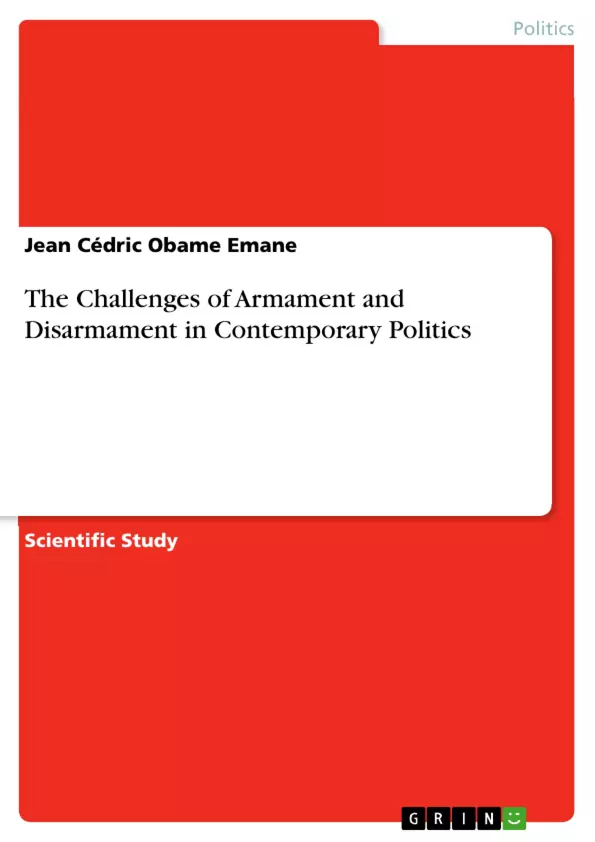Symons (2005) contended that the dawn of the nuclear era has brought with it a new power, terrifying in its capacity to wipe out; awesome in its potential for good, a great contrast that confronts the world today. On the one hand, nuclear power represents a significant climate friendly source of energy. Furthermore, its applications go far beyond civil nuclear power – the preservation of food and the prevention of diseases are being revolutionized by nuclear technology – and in effect, nuclear power will practically be certainly essential if we must continue our adventure of exploration beyond our solar system (Symons, 2005).
Inhaltsverzeichnis (Table of Contents)
- World Military Expenditure and Nuclear Armament
- Early Approaches to Disarmament and Humanitarian Law of War
- Dynamics of the Arms Race
- Policies on Nuclear Disarmament
- Humanitarian Law of War
- Practical Obstacles to Nuclear Disarmament
- Nuclear-Weapon States Security Concerns
- Non-Nuclear-Weapon States Security Concerns
- Nuclear Disarmament Verification
Zielsetzung und Themenschwerpunkte (Objectives and Key Themes)
This text examines the challenges of armament and disarmament in contemporary politics. It aims to analyze the historical and contemporary dynamics of the arms race, focusing on the impact of nuclear weapons and the development of disarmament policies and agreements. The text explores both the successes and failures of international efforts to curb nuclear proliferation and achieve nuclear disarmament.
- The history and dynamics of the arms race
- The development and implementation of nuclear disarmament policies
- The challenges of verifying nuclear disarmament
- The role of international organizations in nuclear security and disarmament
- The interplay between nuclear and conventional weapons in international security
Zusammenfassung der Kapitel (Chapter Summaries)
The first chapter explores the rapid growth of global military spending and the escalating nuclear arms race in the 1970s, focusing on the stockpiling of nuclear weapons by the superpowers. It highlights the concept of Mutually Assured Destruction (MAD) and discusses the impact of the Strategic Arms Limitation Treaty (SALT II) on the development of strategic nuclear arsenals.
The second chapter analyzes early approaches to disarmament, examining the limitations of the Partial Test Ban (PTB) and the impact of technological advancements on the arms race. It delves into the role of the United Nations Group of Consultant Experts (UNGCE) in understanding the global dynamics of armament and the consequences of nuclear proliferation.
The third chapter investigates the history of nuclear disarmament policies, focusing on the concept of deterrence and exploring its application in various contexts. It provides a detailed analysis of the Non-Proliferation Treaty (NPT), its objectives, and its effectiveness in preventing nuclear weapons proliferation. The chapter highlights the challenges of implementing Article VI of the NPT, which commits states to pursuing nuclear disarmament.
The fourth chapter examines practical obstacles to nuclear disarmament, focusing on the security concerns of nuclear-weapon states (NWS) and non-nuclear-weapon states (NNWS). It analyzes the reasons for NWS reluctance to disarm and the challenges associated with verifying nuclear disarmament agreements.
The fifth chapter delves deeper into the challenges of verifying nuclear disarmament, exploring the technical, legal, and political complexities involved. It highlights the role of the International Atomic Energy Agency (IAEA) in verifying nuclear disarmament and the limitations it faces in accessing sensitive nuclear sites.
Schlüsselwörter (Keywords)
This text focuses on key themes and concepts related to armament and disarmament, including nuclear weapons, nuclear proliferation, nuclear disarmament, deterrence, verification, international security, and the role of international organizations such as the NPT, IAEA, and UN Security Council. The text examines the security concerns of both NWS and NNWS and the complexities of achieving a world free of nuclear weapons.
Frequently Asked Questions
What is Mutually Assured Destruction (MAD)?
MAD is a doctrine of military strategy in which a full-scale use of nuclear weapons by two or more opposing sides would cause the complete annihilation of both the attacker and the defender.
What is the Non-Proliferation Treaty (NPT)?
The NPT is an international treaty whose objective is to prevent the spread of nuclear weapons and weapons technology, to promote cooperation in the peaceful uses of nuclear energy, and to further the goal of disarmament.
Why is verifying nuclear disarmament so difficult?
Verification is complex due to technical challenges, the need for intrusive inspections of sensitive military sites, and the political distrust between nuclear-armed nations.
What role does the IAEA play in nuclear security?
The International Atomic Energy Agency (IAEA) serves as the world's "nuclear watchdog," verifying that states are not diverting nuclear material for weapons purposes.
What are the security concerns of Non-Nuclear-Weapon States?
These states often worry about being threatened by nuclear-armed nations and demand "negative security assurances" that nuclear weapons will not be used against them.
- Citar trabajo
- Dr. Jean Cédric Obame Emane (Autor), 2018, The Challenges of Armament and Disarmament in Contemporary Politics, Múnich, GRIN Verlag, https://www.grin.com/document/441421



